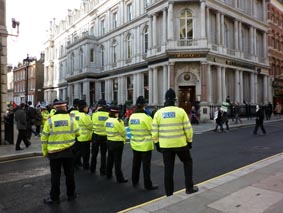The Police Federation of England and Wales organised the May 10 protest march by rank and file police to highlight concerns about the consequences of 20 percent cuts for public safety and the what the federation termed the disproportionate attack on policing by the government.
The march began at Millbank, London at noon passing the Home Office, Parliament Square, Whitehall (Downing Street), Trafalgar Square, and will terminate at Waterloo Place.
Paul McKeever Chairman, Police Federation of England and Wales said: “The march is the only way that police officers can demonstrate their anger. We have been inundated with messages of support from our colleagues who cannot attend due to their work commitments. The officers marching are doing so in their own time, that’s how strongly they feel. Some will have been travelling since 4am to ensure they can take part. The reality of the cuts to policing is really beginning to bite; numbers are beginning to fall rapidly. In the past year alone, we have lost over 5,200 police officers from the frontline and we are witnessing the privatisation of core policing roles as chief officers struggle to cope with budget restraints. The government need to be realistic about the outcome of severe cuts to policing; we cannot afford to compromise on public safety.”
Meanwhile Policing and Criminal Justice Minister Nick Herbert wrote to officers across England and Wales ahead of the Police Federation march in London.
He outlined the government’s support for police officers and set out plans for the creation of a Police Professional Body. He reminded officers of the work the Government has done to end centralised targets, cut bureaucracy and restore discretion.
On changes to pay and conditions, he said that it is right in principle to reward officers for the job they do and the skills they have rather than time served. But he emphasised that the government will take great care to ensure that police officers are fairly treated.
Mr Herbert said: ‘As a service spending some £14 billion a year it is right for the police to make their contribution to reducing the record budget deficit. Her Majesty’s Inspectorate of Constabulary has set out that forces can make savings of over £1 billion a year while maintaining the service to the public. The two-year pay freeze and better procurement will help to make further savings.
‘Existing police pay and conditions were designed more than 30 years ago which is why we asked Tom Winsor to carry out his independent review based on the principle that pay should reflect an officer’s job, skills and hard work, rather than simply time served. These changes are currently subject to formal negotiations. The pay freeze and pension changes are applying across the public sector, but we will continue to ensure that police officers are rewarded for the exceptional job they do.’
Meanwhile, the Chief Constable of Gloucestershire Constabulary has resigned. Responding to that news Paul McKeever, Chairman of the Police Federation of England and Wales, said: ‘The resignation of Chief Constable Tony Melville demonstrates the enormous difficulties and pressures being faced by police officers across the country during a time of radical untested change within the service and drastic cuts to the police budget. However, we are unsurprised at his announcement, as it reflects the mood within the service and the views being expressed privately to us by many senior officers who are deeply concerned about the future of British policing. We share those very real concerns; enough is enough.’









